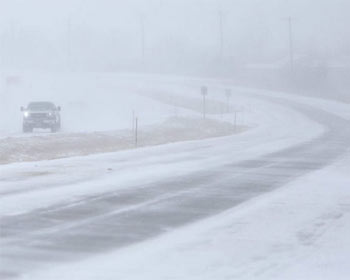Study of Driver Behavior in Adverse Weather is Step to Improved Traffic Management
Posted: Oct 1, 2019
 About 24 percent of all reported U.S. motor vehicle crashes are related to adverse weather conditions. By improving their understanding of driver behavior in these conditions, MPC researchers at the University of Wyoming hope to develop and implement more weather responsive traffic management strategies like variable speed limits. They collected data along different corridors of I-80 in Wyoming to study the relationship and impacts of adverse weather conditions on speed selection behavior, particularly focusing on how changes in speed behavior during a winter storm will affect behavior with resulting impacts on headways and spacing. Pavement surface conditions were found to cause significant average speed reductions and increase speed variability among vehicles. The impact of truck percentage is similar to other weather parameters in the model and was found to have a significant impact on reducing average speed. It was also found that headways and spacing were increased during non-ideal weather conditions. Average speed was found to be more sensitive than average spacing. A key finding was that VISSIM, a widely used traffic flow simulation software package, can be used to calibrate the impacts of adverse weather conditions on traffic operations and weather-responsive traffic management strategies, allowing for its use in testing the impacts of adverse weather conditions before those strategies are deployed
About 24 percent of all reported U.S. motor vehicle crashes are related to adverse weather conditions. By improving their understanding of driver behavior in these conditions, MPC researchers at the University of Wyoming hope to develop and implement more weather responsive traffic management strategies like variable speed limits. They collected data along different corridors of I-80 in Wyoming to study the relationship and impacts of adverse weather conditions on speed selection behavior, particularly focusing on how changes in speed behavior during a winter storm will affect behavior with resulting impacts on headways and spacing. Pavement surface conditions were found to cause significant average speed reductions and increase speed variability among vehicles. The impact of truck percentage is similar to other weather parameters in the model and was found to have a significant impact on reducing average speed. It was also found that headways and spacing were increased during non-ideal weather conditions. Average speed was found to be more sensitive than average spacing. A key finding was that VISSIM, a widely used traffic flow simulation software package, can be used to calibrate the impacts of adverse weather conditions on traffic operations and weather-responsive traffic management strategies, allowing for its use in testing the impacts of adverse weather conditions before those strategies are deployed
Rhonda Young, Ph.D.
University of Wyoming